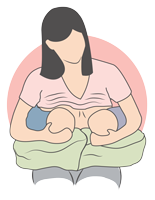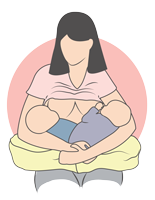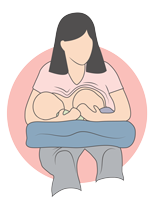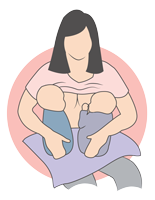Free online breastfeeding and newborn classes
As a new parent, you might have questions about feeding your baby.
Breastfeeding
Breast milk can help your baby grow and develop. Breast milk and vitamin D are all your baby needs for their first six months. Breast milk changes to meet your baby's growing needs. After six months, you can gradually start solid foods. You can continue breastfeeding for two years or longer.
| Information about breastfeeding |
Breastfeeding is important for you and your baby
- Protects your baby from many infections and illnesses.
- Promotes healthy brain development.
- Is always available and the right temperature.
- Is low cost and friendly to the environment.
- Protects you from breast cancer, ovarian cancer and diabetes.
- Can have a calming effect on mom and baby.
You may have a lot of questions about breastfeeding
- How do I know if my baby is getting enough?
- How will I know if my baby latches properly?
- What do I do about sore nipples or breasts?
- What is skin to skin?
- When can I exercise?
- What medications are safe to take?
- Where can I get help?
For more information, read Breastfeeding matters: An important guide to breastfeeding for women and their families.
For frequently asked questions about breastfeeding see:
You can also find information on the breastfeeding information for parents website.
Can I drink alcohol while breastfeeding?
Alcohol is transferred through breast milk. There is no safe level of alcohol in breast milk for a baby. Speak to your health care provider if you have questions about alcohol and breastfeeding.
Finding support
There is help to support you with feeding your baby.
Durham Health Connection Line
- Speak to a nurse who can answer your questions.
- Nurses will also give you information about breastfeeding groups, breastfeeding home visits and the breastfeeding clinic.
- Contact Durham Health Connection Line
Durham Region breastfeeding resources
Health Department breastfeeding group calendar.
Find breastfeeding groups, lactation consultants, equipment rentals and more breastfeeding resources.
Telehealth
Speak to a Registered Nurse 24/7. Call Telehealth Ontario at 1-866-797-0000
|
| Breastfeeding multiples |
It is possible to breastfeed two babies at once and will take time and patience to learn. You may need help from a friend or family member. Before feeding two babies at the same time, get comfortable feeding each baby alone.

Double football hold (double-clutch hold)
This position is good if:
- You are learning to breastfeed.
- Your babies are small or premature.
- You have large breasts.
- You had a caesarean birth.
Follow these steps:
- Use a breastfeeding pillow for twins or place two pillows on your lap.
- Position the baby with the stronger suck first.
- Place one baby on each pillow with their face towards your breasts and their feet towards your back.
- When the first baby is latched on, adjust the pillow to hold them in position.
- Their bodies should lie under each of your arms.
- Repeat steps for the second baby.

Double-cradle hold (criss-cross hold)
This position is good if:
- You are comfortable with breastfeeding.
- Your babies are latching well.
Follow these steps:
- Place a pillow under each elbow and one on your lap.
- Position one baby at a time on your breast.
- The baby should be raised to the level of your breast.
- The babies will be lying on their sides and they will criss-cross.
- Use your arms to support their backs and wrap your hands around them to pull them close to you.

Cradle-football hold
This position is good if:
One or both babies has difficulty latching.
Follow these steps:
- Place pillows on your lap as needed for support.
- Hold the first baby in the cradle position facing you. Their head is in the bend of your arm and their body is across your chest.
- The second baby is in the football hold on your other breast facing you with their body tucked under your arm.

Upright hold (like the double-cradle hold)
This position is good if:
You are breastfeeding at night.
Follow these steps:
- Position one baby at a time on your breast.
- The baby should be raised to the level of your breast.
- The babies will be lying on their sides making a "V".
- Use your arms to support their backs and wrap your hands around them to pull them close to you.
|
| Nursing strike |
|
Nursing strike (also called breast refusal) is when a baby who has been breastfeeding well suddenly refuses the breast. This mostly happens before baby is 12 months old and can last a few days or longer. This is not the same as natural weaning when the baby moves from breast milk to other sources of food.
Causes
Sometimes the cause is unknown. Possible causes may include:
Baby
- ear infection, cold or other illness
- mouth pain from teething or thrush
- acid reflux
- recent immunization
- stress, upset, easily distracted or overstimulated
- allergy or sensitivity caused by new maternal medication, foods or vitamins
- reaction to new soap, lotion, deodorant or detergent mother may have used
Mom
- new pregnancy
- low milk supply or fast flow of milk
- negative reaction when baby bites
- long separation from baby
What to try
- breastfeed in a quiet place
- breastfeed when baby is sleepy
- change breastfeeding positions
- place baby skin to skin
- hand express before latching to start milk flow
- breastfeed based on feeding cues
- baby wearing (allows baby to see, smell, touch and taste at the breast)
- if breasts are full try pumping and giving expressed breast milk by cup
- avoid bottles or pacifiers
- if baby takes a bottle, start with the bottle and when actively sucking slowly take the bottle out and latch baby to the breast
- keep feeding times happy
|
|
The Baby-Friendly Initiative
|
The Baby-Friendly Initiative (BFI) is a worldwide program from the World Health Organization (WHO). WHO partnered with United Nations International Children's Emergency Fund (UNICEF). The aim is to protect, promote, and support breastfeeding.
Durham Region Health Department is a "Baby-Friendly" facility.
Durham Region Health Department is committed to:
- Giving you up-to-date information about feeding your baby.
- Supporting and respecting your decision on how to feed your baby.
- Supporting mothers to breastfeed exclusively for the first six months of life.
- Supporting the addition of iron-rich complimentary foods at six months.
- Supporting mothers to continue breastfeeding up to two years and longer.
- Welcoming and encouraging mothers to breastfeed anytime, anywhere.
- Working with the community to protect, promote, and support breastfeeding.
Where can I get more information on the baby-friendly initiative?
|
|
Artificial baby milk (formula)
|
Think about these questions when you decide to feed your baby formula:
- What type of formula do I want to use?
- How do I sterilize the equipment?
- How do I make the formula?
- How much will my baby need?
- How do I feed formula to my baby?
Get the facts to make an informed decision about formula feeding your baby.
For more information, read Infant formula: What You Need to Know. This information is for healthy babies born full term. Speak with your health care provider to learn about formula for preterm or babies who are unwell.
More tips on how to prepare and feed your baby formula:
|
|
Feeding your baby during an emergency
|
|
During an emergency, normal infant feeding patterns may be disrupted.
During emergencies such as floods, power outages or nuclear disasters, many homes may lose access to clean water, electricity and food. These situations may make it hard to safely prepare infant formula.
The following recommendations will help you prepare for an emergency to make sure your baby continues to receive safe nutrition:
- Powdered infant formula is not recommended when there is no access to clean water or unlimited hot water used for sterilizing.
- Ready-to-feed infant formula is the best option in these situations.
- Make sure you have enough supplies for a minimum of three days (72 hours).
- Do not feed your infant solid foods unless they have reached six months of age or older.
- Do not use any infant formulas that are expired.
|
|
Starting solids
|
You may have questions about starting solid foods. Use these tips to help you get started.
When do I start?
Solid foods give your baby iron and other nutrients they need for energy and healthy growth. Babies can start solids around six months of age. They can also start when they show signs they are ready.
Your baby is ready for solids when they can:
- Sit up with or without support in a high chair.
- Open their mouth when they see food coming.
- Keep their mouth open when they want something.
- Turn their head away if they do not want something.
- Close their lips over a spoon.
- Keep food in their mouth.
- Show interest in food when others are eating.
What textures should I start with?
You can start your baby with a variety of food textures such as:
- Pureed
- Mashed
- Finely chopped
- Lumpy
- Soft finger foods
What foods should I start with?
The first solid foods offered should be rich in iron. Examples include:
- Baby cereal with added iron.
- Meat, well-cooked mashed eggs, tofu, lentils or beans.
After iron-rich foods, try:
- Well-cooked mashed sweet potato or squash.
- Soft-cooked pieces of carrots or broccoli.
- Pieces of banana, mango, pears or peaches.
- Full fat cheese and yogurt - grated cheese, plain cottage cheese or yogurt.
- Strips of whole grain toast, "O" shaped cereals and well-cooked pasta.
For information on how to start solids, how much your baby should be eating, food ideas and what to do if your baby refuses new foods, read:
|
|
Transition to cup
|
Children should start drinking from a cup by 12 months. After this age, drinking anything other than water from a bottle can increase the risk of tooth decay.
Tips to introduce a cup:
- Offer a cup as early as six months.
- Offer a cup at meal and snack time.
- If using a spill-proof training cup, take out the valve so your child learns to drink without sucking.
- Do not let your child walk around with a bottle.
- Do not put your child to bed with a bottle.
- Let your child choose a new cup at the store.
|
| Who should I call with questions? |
|
Durham Health Connection Line
Public health nurses provide phone advice, as well as written information.
Telehealth Ontario
Get free advice from a registered dietitian on nutrition and healthy eating.
Call 1-866-797-0000
For more nutrition information, visit unlockfood.ca.
|









